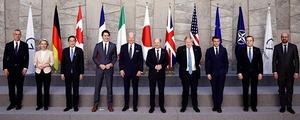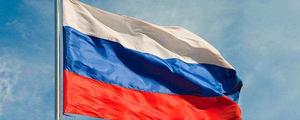What do the findings of Gallup's latest Rating World Leaders report tell us about perceptions of world leaders in the run-up to Russia's invasion of Ukraine? Have views of U.S. leadership changed since the withdrawal of troops from Afghanistan? Julie Ray, Gallup's managing editor for world news, joins the podcast to break down this year's findings. Later, Marie Royce -- former assistant secretary of state for educational and cultural affairs -- joins to discuss the impact of U.S. diplomacy and programs across the world.
Below is a full transcript of the conversation, including time stamps. Full audio is posted above.
Mohamed Younis 00:07
For Gallup, I'm Mohamed Younis, and this is The Gallup Podcast. In this episode, we explore how some of the world's most powerful leaders fare in terms of global public opinion and why it matters. Julie Ray is managing editor for world news at Gallup and author of the Gallup Global Leadership Report. Julie, welcome back to the podcast.
Julie Ray 00:28
Thanks for having me.
Mohamed Younis 00:29
The ratings in this report were collected prior to the invasion of Ukraine by Russia. What do they tell us about where things at least stood prior to that invasion, in terms of U.S. approval and Russian approval in specific?
Julie Ray 00:43
Sure. So the ratings, we have a global leadership approval rating of the U.S., Russia, Germany and China from 2021. We collected these data across 116 countries and territories. So the findings for the U.S. showed that final approval rating during Joe Biden's first year in office stood at 45%. So that's a little bit lower than the global approval rating for Germany, which was 50%. And then Russia and China were much, much lower on the list, with ratings in the, in the low 30s.
Mohamed Younis 01:23
One of the other events that took place recently and through the period in which we were polling the world on global leadership was the U.S. withdrawal from Afghanistan, which obviously captured global attention in a very bad way for the U.S., and obviously tragically for the people of Afghanistan. Did perceptions of the U. S. leadership approval at least change during that time? Did you pick that up at all in our polling?
Julie Ray 01:51
They did. So we did about 46 countries during the first half of the year before the U.S. military withdrew from Afghanistan in August. And so approval ratings across those 46 countries stood at 49%, which is actually pretty close to the approval rating that Barack Obama got in his first entire year in office, in 2009. But what we saw in the latter half of the year, we did about 70 countries that overlapped that period from when the U.S. was withdrawing and postwithdrawal. So we saw that ratings actually dropped a bit. They were, the average was 43% in that period, compared to the 49%. So that's, that's a bit lower than that initial reading. But, but one thing that to caveat that finding: We can't for sure pinpoint that the withdrawal was the cause of that, so, because we don't have measures in the same set of countries before and after. But very well it could have factored into people's opinions.
Mohamed Younis 02:55
I also noticed in the report, you highlighted how NATO countries had a sort of recovered improved perception of U.S. leadership since the Trump administration to the Biden administration before the war in Ukraine, which obviously is playing a critical role now in how those nations perceive the U.S. and its role in the world. I did want to ask you, though, beyond Ukraine, what were some of the other regional highlights that caught your eye -- a part, parts of the world where these global powers were doing really well or really poorly and surprised you?
Julie Ray 03:30
One of the things that, that surprised me actually was Africa, so, in terms of relations with the U.S. You know, in the past we've seen typically pretty high approval ratings in Africa over the years. And that's, that's consistent from 2007 to 2021, when we've been collecting these data. But the big boost actually in 2021 -- we saw ratings just boost to 60%, which was, is pretty high, given the relative trend that we have. So that was a little surprising to see that big jump in Africa. We also saw a pretty big jump in the Americas as well. So we saw pretty hefty jumps for U.S. approval in both of those regions.
Mohamed Younis 04:18
That's Julie Ray, managing editor of world news at Gallup and the author of the Gallup Global Leadership Report. Julie, thanks for being with us.
Julie Ray 04:27
You bet. Thanks.
Mohamed Younis 04:30
And now joining us to discuss these findings in the broader context of diplomacy and programming, Marie Royce is a businesswoman, diplomat and educator. She also served as the former assistant secretary of state for educational and cultural affairs. Marie, welcome to the podcast.
Marie Royce 04:46
Thank you, Mohamed.
Mohamed Younis 04:48
Every year we at Gallup release our Global Leadership Report, which is basically a look at how those leading the global powers fare, in terms of public opinion across the world. I want to start by asking you, does soft power still matter in this modern world? In other words, should countries care about how they're viewed globally?
Marie Royce 05:09
Well, first I want to say again, thank you for having me on the show. I look forward to this report every year. Soft power really matters. Soft power is really about the development of leaders, and leadership continues to matter. Now, I worked in a bureau, and I had an opportunity to work with an incredible team where we worked on exchanges both inbound and also outbound. And I know firsthand, as an alumna of the American Council of Young Political Leaders, what it's like to have the opportunity to have an exchange program. I was able to be part of a bipartisan delegation of leaders -- Democrats, Republicans and independents -- where we went to Poland and Hungary together for two weeks right after 9/11.
Marie Royce 06:04
It was so incredibly transformative that I still stay in touch with the other leaders today. And I, it really broadened my world and made me want to continue in the area of leadership exchanges. I served on two exchange boards, and I continue to support many of these initiatives. We actually had private-public partners who actually helped give them different products. For example, Amazon Web Services gave women cloud services in Chile as an example. And you might ask again, why does soft power matter? One alum within a year grew from having one employee to six. What did she learn in AWE -- Academy for Women Entrepreneurs? How to create a business plan, how to raise capital, how to do marketing. When I was out in Bogota, one woman cried. She said, "I have a business, but I have no business training." So this is just one of many examples of why soft power matters and these enduring relationships last forever.
Mohamed Younis 07:13
I've been part of one of these programs, and it is extremely powerful. But so much of what the world sees from here, obviously we're talking about the United States, but really any global power -- whether it's China or Russia, Germany -- a lot of what they see from these actors are policies that impact their own lives. Like for example, right now, a big part of the world is impacted by food prices that are, you know, impacted by the pandemic but exacerbated by the war in Ukraine. So their only involvement or focus on Russia, for example, is now everything is more expensive where they live. Why? Because there's a war in Russia. Why is it important to create these other opportunities of exchange between citizens beyond these macropolicy, turbulent impacts on lives that obviously are impossible for one person to control but are very much real for the people that are impacted by them, whether it's financial, whether it's security? Why are these citizen-to-citizen relationships so important?
Marie Royce 08:21
You brought up an excellent point about, you know, all these dramatic events around the world and trying to get information about them, for example. One of the things you probably are very aware of is the amount of disinformation that we have around the world and especially in certain parts of, let's say Central Asia, Eastern Europe, for example, or even around different parts of Asia. And one of the things that citizens exchanges do is this network of collaboration helps counter that disinformation. Imagine two doctors doing research together. That's one of our programs, as far as part of the private-sector exchange initiatives or through the Fulbright Program or the fact that you could actually just pick up a phone or, or send a text message. So again, that's very exciting. So again, these exchanges definitely matter.
Mohamed Younis 09:17
I remember one thing that really stood out to me in the program I was involved in. I went to Oslo, Norway, and actually a couple of places in Norway, Ireland and Belgium. And what was really in, and it was during the height of the war on terror, the war in Iraq. I mean it was like full-blown, you know, it was a very difficult time to be associated in any way with the U.S. government anywhere in Western Europe, because the U.S. was really at the forefront of a lot of policies that were very unpopular there.
Mohamed Younis 09:50
But one of the most powerful things that I saw happening was, as people interacted with our delegation of American citizens who had all different views and perspectives on what was happening, it really struck them and people kept commenting on the fact that we were not necessarily supporting U.S. policy; in many conversations, we were criticizing U.S. policy if we didn't agree with what was happening. How important is it to create opportunities for people to just connect on a human level and be able to talk about things that go beyond, "What's your position on your country's policy?" to "We're, we're both artists" or "We're both scientists" or "We're both, you know, engineers," but we happen to come from different parts of the world, and there are opportunities for us to connect as engineers and not necessarily have to talk about the fact that our two countries have policies that are impacting people we love?
Marie Royce 10:47
One of the biggest takeaways for exchange participants, especially those that are inbound, we have a three high school programs where students stay for 10 months. Those are Future Leaders Exchange, Kennedy-Lugar Exchange, we call that "YES," and the Congress-Bundestag, with, where Congress and the Bundestag Germany put in money, is that young people are really struck by the fact that people can have those free conversations. You know, we don't give our exchange participants like yourself when you went outbound, Mohamed, a script. We don't say, "This is what you're supposed to say or do and this is where you have to go." You really have the opportunity to really say what you think and get input and have your own transformative experience. And, and that's incredibly powerful. And so do those young people that come. It's not a Potemkin Village when you come to the United States; they get to see everything.
Marie Royce 11:47
And what's really exciting is they also, many of them participate in community service -- the ones that stay here for close to a year and live with a host family. In fact, I've learned from talking to young people that they're going to go back to their countries and try to help people every day in their communities and take some of those values that they've learned in the United States, whether it's helping in a school or a hospital. So I would, I would just add that, being able to have those open conversations and again, you know, having, for example, if you want to talk about, let's say a democratically held election for example, you know, or the fact that different people can voice their own opinions.
Marie Royce 12:36
I mean it is really fortunate that we are in a free society. Or even on the education on, in, on a campus, with academic freedom. You know, so many of us in the United States have such incredibly good memories of college where if we, if we had the opportunity to go to college, we would be able to think about being able to express yourself and learn and ask questions -- just like you would as, maybe like two engineers would ask or talk to each other, or let's say two scientists or even two people in the arts. And, and that is really wonderful because you get exposed to so many different cultures, and it's really powerful.
Mohamed Younis 13:18
It was really powerful, I think, for audiences to see the variance in experiences on exactly the same topics we were discussing, just between the U.S. citizens in the delegation. You know, one thing that a lot of people don't realize about the United States is that it's an enormous place with a lot of different cultures and experiences. And I thought some of the most interesting conversations I had on that trip were actually with the other U.S. citizens, just comparing like how different things were where we grew up, where we lived in the U.S. But, you know, one of the challenges always is that we live in a world of policy and reality. And the last question I want to ask you is, don't ultimately these huge policy clashes -- these, you know, what are perceived by many of the recipients of policies as bad policy decisions -- don't they undo the good that a lot of these citizen exchange and education programs achieve?
Marie Royce 14:20
Well, that's a terrific question and I want to say that citizen and education programs endure over time. You know, these policies is, whether, let's say, I want to say, what's your policy on Northern Ireland? What's your policy on, on Venezuela? You can go through all these different, what's your policy on Colombia? None of this really matters over time in the fact that -- in the sense that these relationships endure, and these programs are lasting. And we've got, you know, Fulbright that just hit 75 years as an example, but there's new initiatives, you know, and new young people. And so consequently, again, those are lasting again over time. You know, it's kind of like planting, planting a seed, right? And you have the plants that start to grow, and then they become leaders that are now deciding to run for, let's say, political office and then some of them might even become a prime minister and many could even become a Nobel Prize winner or could be a CEO of a company.
Marie Royce 15:29
But I really appreciated that, that opportunity. You know, every person that gets to be part of these groups has this same unique opportunity. And one thing I do want to add is about the fact that we keep, keep those people close to us because we have an alumni organization. We try to keep people connected. We want to make sure we also try to measure impact to know what, what kind of impact these programs are having. So again, and you know what's so cool is that today we have so many more tools to keep people connected than we ever had. You know, you can use Slack or you can use, let's say, some kind of video chat to someone else or do a Zoom meeting. When I would do these exchange programs during COVID, it was pretty amazing. We had, like, a group of leaders from Africa, and there was 12 of them. And they went to four to six cities and met with mayors and leaders. They did it as a delegation, but they did it all virtually.
Mohamed Younis 16:37
Absolutely, and that's really the power of these programs. And I'm so thankful, Marie, that you came by to share some of these stories because it really creates lasting and impressionable experiences that stick with people. That's Marie Royce, currently of USC, former assistant secretary of state. Marie, thank you for being with us on the show.
Marie Royce 16:57
Thank you, Mohamed.
Mohamed Younis 17:05
That's our show. Thank you for tuning in. To subscribe and stay up to date with our latest conversations, just search for "The Gallup Podcast" wherever you podcast. And for more key findings from Gallup News, go to news.gallup.com or follow us on Twitter @gallupnews. If you have suggestions for the show, email podcast@gallup.com. The Gallup Podcast is directed by Curtis Grubb and produced by Justin McCarthy. I'm Mohamed Younis, and this is Gallup: reporting on the will of the people since the 1930s.



